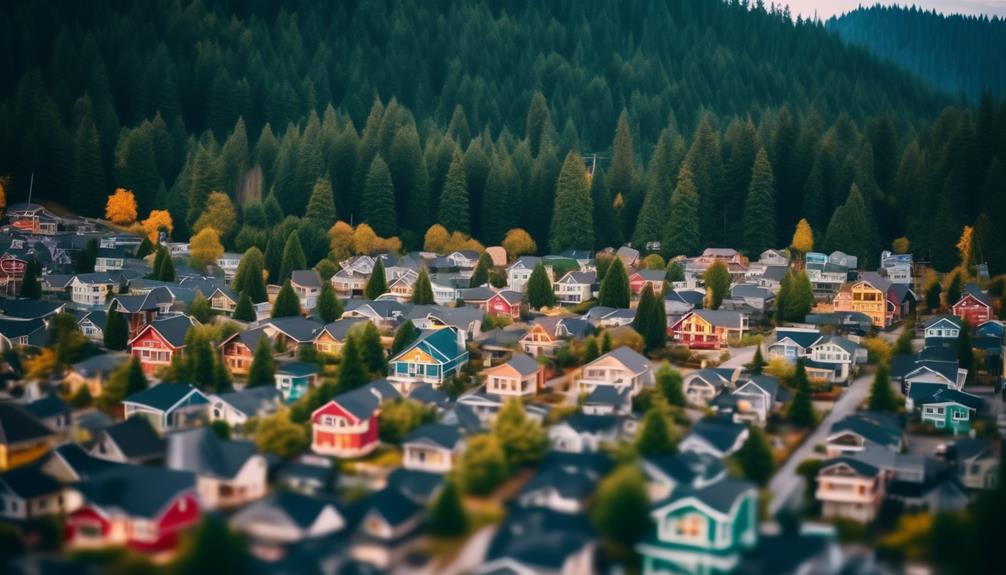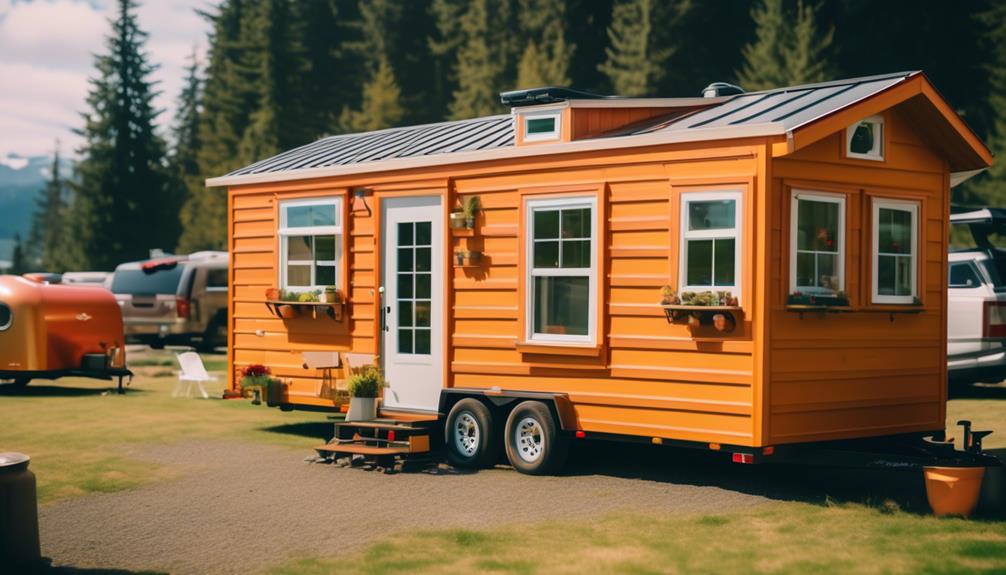The allure of tiny houses has taken hold in Washington State, as more and more individuals seek a simpler and more sustainable way of living. This emerging trend, known as the 'tiny house boom,' has gained traction due to the affordability, mobility, and environmental consciousness that tiny houses offer.
However, navigating the legal and regulatory landscape surrounding these compact dwellings can be a complex endeavor. In this article, we will explore the intricacies of tiny house legality and regulations in Washington, shed light on the costs and budgeting considerations involved, and unveil some of the cities in the state that embrace the tiny house movement.
Additionally, we will provide insights into reputable builders and trailer dealers, leaving you eager to discover more about the tiny house phenomenon in Washington State.
Key Takeaways
- Tiny houses are legal in Washington state and some cities have adopted ordinances to allow tiny houses on wheels.
- There are specific regulations and codes that tiny houses must meet in order to be considered legal, including size restrictions and compliance with building codes.
- The cost of a tiny house in Washington can range from $45,000 to $120,000, depending on factors such as size, materials used, and level of customization.
- Olympia, Spokane, Vancouver, and Seattle are considered to be tiny house friendly cities in Washington, offering opportunities for tiny house dwellers to find suitable places to park or build their homes.
Legality and Regulations
Tiny houses in Washington are subject to specific regulations and codes that must be met in order to be considered legal. These regulations ensure the safety and compliance of tiny houses with building codes and zoning ordinances. To navigate the permitting process for tiny houses in Washington, it is important to research and understand the specific regulations in the area where you plan to build or park your tiny house.
This includes size restrictions, setback requirements, and utility connections. Additionally, it is important to consult with local authorities and obtain the necessary permits and approvals before starting construction.
Despite the regulatory process, there are numerous benefits of tiny house living in Washington, including affordability, environmental sustainability, and the opportunity for a minimalist lifestyle. By understanding and complying with the regulations, individuals can enjoy the advantages of tiny house living in Washington.
Costs and Budgeting
When considering the financial aspects of building or purchasing a tiny house in Washington, it is essential to carefully evaluate and plan for the costs involved. Here are some key points to keep in mind:
- Tiny house financing options: Explore different financing options such as personal loans, RV loans, or crowdfunding platforms specifically designed for tiny house projects. Researching and comparing interest rates and terms can help find the best financing option for your needs.
- Tips for saving money on tiny house construction: Consider using salvaged or recycled materials, which can significantly reduce costs. DIY construction can also save money, but it is important to have the necessary skills and knowledge. Planning ahead and creating a detailed budget can help identify potential areas for cost savings.
- Research different builders and compare prices: Take the time to research and contact different tiny house builders in Washington. Comparing prices, reputation, and quality of work can help find the right builder for your project while staying within your budget.
Tiny House Friendly Cities

Olympia, Spokane, Vancouver, and Seattle are among the cities in Washington that have embraced the tiny house movement and established regulations to accommodate tiny house dwellers. These cities provide opportunities for individuals interested in living in a tiny house community to find suitable places to park or build their homes. When choosing a tiny house location, there are several factors to consider. One benefit of living in a tiny house community is the sense of community and shared values that often come with it. Additionally, living in a tiny house can lead to a more sustainable and environmentally friendly lifestyle. Table below provides an overview of the benefits of living in a tiny house community and factors to consider when choosing a tiny house location:
| Benefits of living in a tiny house community | Factors to consider when choosing a tiny house location |
|---|---|
| Sense of community and shared values | Access to amenities and services |
| Sustainable and environmentally friendly | Proximity to work, schools, and transportation |
| Lower cost of living | Zoning and regulations |
Tiny House Builders
Several reputable builders in Washington specialize in constructing high-quality tiny houses. These builders offer innovative designs and sustainable construction practices to cater to the growing demand for tiny homes. Here are three reasons why these builders are worth considering:
- Sustainable design in tiny house construction: Builders in Washington prioritize eco-friendly materials and energy-efficient systems, ensuring that their tiny houses have a minimal environmental impact.
- Benefits of downsizing to a tiny house community: These builders understand the advantages of living in a tight-knit community and design their tiny houses to promote social interaction and shared resources.
- Customization options: Builders offer a range of options for customization, allowing individuals to personalize their tiny houses according to their needs and preferences.
When choosing a builder, it is essential to consider their experience, reputation, and commitment to quality. By working with these reputable builders, individuals in Washington can achieve their dream of living in a well-designed, sustainable tiny house community.
Tiny House Trailer Dealers

In Washington, there are reputable trailer dealers that specialize in providing high-quality trailers designed specifically for tiny houses. These tiny house trailer dealers offer a range of customization options to ensure that the trailer meets the unique needs and preferences of the tiny house owner.
From choosing the size and layout of the trailer to selecting the materials and finishes, customers have the opportunity to create a customized trailer that suits their vision. Additionally, these trailer dealers prioritize safety and ensure that their trailers meet all the necessary safety standards and regulations.
This includes features such as reinforced frames, sturdy axles, and proper braking systems. By working with these reputable trailer dealers, tiny house enthusiasts can find the perfect trailer that combines innovation, functionality, and safety for their tiny house project.
Frequently Asked Questions
How Can I Find Land to Park My Tiny House in Washington?
Finding land to park a tiny house in Washington requires researching zoning regulations and local ordinances. Consider contacting tiny house communities, RV parks, and private landowners for potential opportunities.
Are There Any Grants or Financial Assistance Available for Building a Tiny House in Washington?
There are grants and financial assistance options available for building a tiny house in Washington. These funding options can provide support for affordable housing solutions and help navigate building codes. Construction loans may also be available.
What Are the Zoning Regulations for Tiny Houses in Washington?
Zoning regulations for tiny houses in Washington are determined by local jurisdictions. These regulations often include requirements related to size, setbacks, and foundation types. Compliance with building codes is also essential for ensuring the legality and safety of tiny houses.
Can I Live in a Tiny House on Wheels Full-Time in Washington?
Living in a tiny house on wheels full-time in Washington is possible, as long as the house meets certain criteria, such as compliance with building codes. It offers an opportunity to live off-grid and embrace a sustainable lifestyle.
Are There Any Tax Benefits or Incentives for Owning a Tiny House in Washington?
There are no specific tax benefits or incentives for owning a tiny house in Washington state. However, financing options such as personal loans, RV loans, and crowdfunding can be explored to help with the purchase or construction of a tiny house.
Conclusion
In conclusion, the tiny house boom in Washington state has brought about a new way of living that combines affordability, mobility, and environmental consciousness.
Despite the complexities of navigating the legal and regulatory landscape, many individuals have embraced this trend.
With careful budgeting and research, aspiring tiny house dwellers can find a suitable location and reputable builders and trailer dealers to help bring their dream homes to life.
Washington state has become a haven for those seeking a simpler and more sustainable lifestyle.

